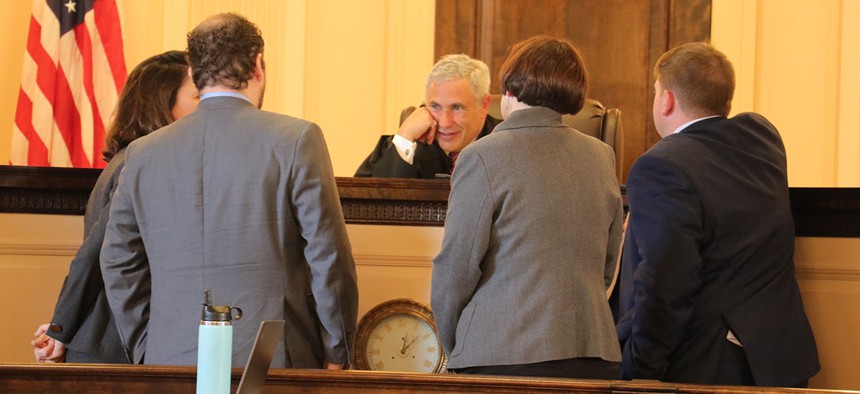Policy
Cuomo lawyers argue ethics commission is unconstitutional
The former governor used to control the state's old ethics commission. Now he's trying to kill the new one.

Judge Thomas Marcelle speaks with attorneys for former Gov. Andrew Cuomo and the state following arguments in Albany County Court Friday. Vaughn Golden
Lawyers representing former Gov. Andrew Cuomo sparred with attorneys representing the state’s newly-revised ethics panel in an Albany courtroom on Friday, the first steps in a lawsuit filed by Cuomo seeking, in part, to derail ethics charges related to his pandemic-era memoir.
The lawsuit has its roots in the former governor’s compensation for his 2020 book, “American Crisis: Leadership Lessons from the COVID-19 Pandemic.” The state’s ethics panel, the Joint Commission on Public Ethics (JCOPE), had initially approved the terms of Cuomo’s book deal, but it reversed course shortly before being dissolved last year and ordered Cuomo to return over $5 million in proceeds.
A judge later quashed JCOPE’s order, but left the door open for the Commission on Ethics and Lobbying in Government (COELIG), the successor to JCOPE, to reopen the case. COELIG did just that, scheduling an adjudicatory hearing related to JCOPE’s earlier investigation into the former governor’s book deal. Earlier this year, Cuomo struck back by filing a lawsuit against COELIG.
On Friday, the former governor’s attorneys argued before Albany County Supreme Court Judge Thomas Marcelle that COELIG’s powers to levy penalties must be removed because the ethics body violates the separation of powers laid out in the state constitution.
At the core of Cuomo’s case is the process by which commissioners are appointed to COELIG – a process that Cuomo’s attorneys say is unconstitutional. Under the statute that created COELIG, commissioners are first nominated by legislative leaders, the governor, state comptroller and attorney general. Then they must be vetted and approved by a special committee made up of deans from law schools around the state. The whole process is designed to insulate the commissioners from the kind of political interference that Cuomo allegedly exerted on JCOPE while in office.
But Cuomo’s attorneys argued in court that COELIG lacks democratic accountability. The panel of law school deans who vet COELIG nominees aren’t public officials and therefore aren’t subject to transparency measures like open meetings law. And once confirmed to the panel, COELIG’s commissioners can only be removed by their fellow commissioners, not by the governor or legislature.
“COELIG is accountable only to itself. It is not accountable to the secretary of state, despite nominally being placed under the secretary of state. It is not accountable to the governor," said Gregory Dubinsky, an attorney for Cuomo. "Only the members of COELIG can remove the members of COELIG. It is the quintessential example of 'who is watching the watchers?'"
Marcelle seemed receptive to the argument.
“Isn't that a problem?” the judge asked, referring to the law school deans’ appointment process. “That you have a few people who are unelected, who are unrepresentative of the state or of the people as a whole, who are not public officers who take no oath to uphold the laws of the state of New York, who are exempt from public meetings laws, who operate in secret, who then cast upon elected officials' nominees with no explanation whatsoever?”
The lawyers for the state responded by emphasizing that the actual COELIG appointees are put forward by elected officials, even if the law school deans evaluating them are not.
"I don't think we have that concern here. Number one, because the quote unquote private individuals here are the deans of the [American Bar Association] accredited law schools who are charged with not selecting from carte blanche from anyone in the world that they want with sitting on this commission, but charged with evaluating the nominees made by the various selection officials."
Marcelle also seemed skeptical of COELIG’s authority to levy fines and penalties without the panel having direct accountability to voters. He also posed the questions suggesting that had COELIG been created through a constitutional amendment like the state’s redistricting commission, it would be on more solid ground.
After conferring with counsel for both sides, Marcelle set a timeline for filing follow-up written briefs. He is expected to deliver an opinion in the lawsuit in the coming weeks. Meanwhile, COELIG’s adjudicatory hearing on Cuomo’s case has been postponed until late September.

